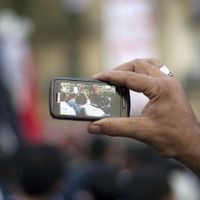“Technology experts expect breached, infiltrated or otherwise compromised cellphones to be the scourge of 2012. The smartphone security company Lookout Inc. estimates that more than a million phones worldwide have already been affected. But there are ways to reduce the likelihood of getting hacked — whether by a jealous ex or Russian crime syndicate — or at least minimize the damage should you fall prey.” (Kate Murphy, NYTimes.com)
Tag Archives: smartphone
What the GPS Device on Antoine Jones’ Jeep Cherokee Means for Internet Privacy
 “What’s interesting here is that there was a 5-4 split on why the Justices ruled as they did. Justice Sotomayor, writing a concurrent opinion, wrote, ‘When the Government physically invades personal property to gather information, a search occurs.The reaffirmation of that principle suffices to decide this case.’ Since the government had invaded property, the Justices did not need to evaluate any of the other principles that this case brings up.
“What’s interesting here is that there was a 5-4 split on why the Justices ruled as they did. Justice Sotomayor, writing a concurrent opinion, wrote, ‘When the Government physically invades personal property to gather information, a search occurs.The reaffirmation of that principle suffices to decide this case.’ Since the government had invaded property, the Justices did not need to evaluate any of the other principles that this case brings up.
And there are many principles that this case brings up. Sotomayor talks about many of them: what about electronic surveillance if no property was trespassed upon? What about the chilling effects of potential long-term electronic surveillance? What about the fact that GPS monitoring gives far more specific information, and is far easier and cheaper, than traditional visual surveillance? What about the fact that this data can be stored and mined later?” (Alice Marwick, Social Media Collective)
With Media, Parents and Kids Learn More Together
“Lori Takeuchi, who wrote this report for the Cooney Center along with Reed Stevens, said what parents decide to do with their kids is largely based on their own childhood experiences. Those who grew up on the Internet or were young enough when they started using it in their daily lives have less fear about dangers.
‘They’re comfortable with fewer rules,’ Takeuchi said about the families she studied for the Families Matter Report she wrote earlier this year. Older parents, on the other hand, tend to use parental controls more. ‘Younger parents are willing to confront media and the unknown with their kids, whereas older parents aren’t.’ ” (Tina Barseghian, Mind/Shift)
A Smart Phone that Knows You’re Angry
“The prototype system, to be presented in Las Vegas next week at the Consumer Communications and Networking Conference, is designed to work as part of a Twitter client on an Android-based Samsung Galaxy S II. It enables people in a social network to view symbols alongside tweets that indicate that person’s emotional state. But there are many more potential applications, says Lee. The system could trigger different ringtones on a phone to convey the caller’s emotional state or cheer up someone who’s feeling low. ‘The smart phone might show a funny cartoon to make the user feel better,’ he says.” (Duncan Graham-Rowe, Technology Review)
In Big Data, Potential for Big Division
“But, as with the rest of the technology revolution, big data is likely to have a more mixed impact on us in our role as workers. David Autor, an economist at the Massachusetts Institute of Technology, has done groundbreaking research on the “polarizing” effect of technology on the labor market: his bottom line is that it has been good for people at the top and not had much of an effect on people doing hands-on jobs at the bottom. But it has hollowed out what used to be the middle. Studying the same phenomenon in the United Kingdom, the economists Maarten Goos and Alan Manning have come up with an evocative term for what is happening — the division of work into ‘lousy and lovely jobs.’ ” (Chrystia Freeland, Reuters/NYTimes.com)
Theater for Twits
“Perhaps the real goal of frightened theater managers is not so much to enhance the experience for the majority, for whom Mozart works just fine without tweets from the balcony, but to make the time go faster for those who barely tolerate the arts but may have purchased a ticket as, say, a favor to their companion. Or maybe it’s just for members of the Twitter-tethered community who believe Mozart is best enjoyed in 140 notes.” (Peter Funt, NYTimes.com)
Clay Shirky: How social media can make history
“What matters here isn’t technical capital, it’s social capital. These tools don’t get socially interesting until they get technologically boring. It isn’t when the shiny new tools show up that their uses start permeating society; it’s when everyone is able to take them for granted.” (Clay Shirky, TED Talks)
Live Streaming As Activism
“There were soccer moms streaming live from soccer games. There were people handing out real time live lectures. So students away from the university could ask questions and interact. A lot of nonprofit organizations picked up the tool here in Sweden. A lot of the political parties started to do press conferences.
Then it sort of moved over during the last years to more activists. Live streaming provides them the opportunity to not be afraid of losing their content, because in scenarios where you’re protesting and the police may confiscate your phones, doing a live stream the content is already out there on the Web.” (Mans Adler, On The Media)
The role of social media in protests
“Digital media has played an important role both in the recent wave of mobilisations in the Arab world and in protests across Western countries, such as the Occupy movement across cities worldwide. This is the first empirical study analysing the mechanisms behind protest recruitment by means of online networks. It shows that mass mobilisations depend not on the influence of central users, who are nonetheless crucial for their growth, but on the actions of many users in local networks that will ultimately reach the influential core” (Dr Sandra Gonzalez-Bailon, Oxford Internet Institute)
TV Channel Squeeze Proposed to Pay for Tax Cuts
 “In a sense, this proposal is a reflection of the times. In the U.S., there are more wireless devices in use than there are people. Meanwhile, various studies show that fewer than 10 percent of households get their TV signals over the air — the rest have cable or satellite service. The FCC’s national broadband plan envisions freeing up 500 megahertz of spectrum over the next 10 years. As much as a quarter of that could come from television. But many things need to happen first. For starters, Congress needs to give the FCC authority to do this.” (Anick Jesdanun, The Associated Press)
“In a sense, this proposal is a reflection of the times. In the U.S., there are more wireless devices in use than there are people. Meanwhile, various studies show that fewer than 10 percent of households get their TV signals over the air — the rest have cable or satellite service. The FCC’s national broadband plan envisions freeing up 500 megahertz of spectrum over the next 10 years. As much as a quarter of that could come from television. But many things need to happen first. For starters, Congress needs to give the FCC authority to do this.” (Anick Jesdanun, The Associated Press)






